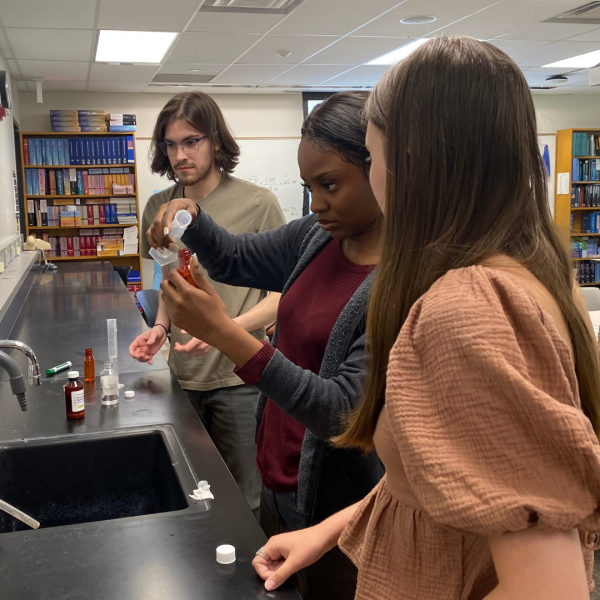Connecting Community and Tribal College Students with the World of Pharmacy

By: Markie Heideman, Content Marketing Manager
From as close as Ypsilanti to as far as L’Anse, Michigan, nine students from community and tribal colleges across Michigan are spending the first several weeks of their summer learning the ins and outs of a career in pharmacy through the College of Pharmacy’s Pharmacy Community College Connect, or PC3, program. The five-week program takes place on the campus of the University of Michigan, along with an upper peninsula option at Keweenaw Bay Ojibwa Community College in L’Anse, Michigan.
“Participants leave the program knowing what steps they need to take to achieve their goal of becoming a pharmacist and knowing more about their own interests. For those who don’t know much about pharmacy, PC3 showcases the different fields and responsibilities of pharmacy,” explained Madison Jeffrey, Assistant Program Manager for Diversity, Equity and Inclusion at the College of Pharmacy.
Students spend five days a week during the program attending non-credit courses in pre-pharmacy requirements including biology and math. Additionally, they receive mentorship from current U-M PharmD students and hands-on opportunities to understand the doors a career in pharmacy can open.
“This year, our students will get the opportunity to listen to speakers from U-M and one of our partner tribal colleges (KBOCC) to hear about pathways to pharmacy and experiences in the different branches of the field,” Jeffrey explained. “Faculty in the College of Pharmacy have been very supportive, running workshops and having students practice taking blood pressure and learning drug compounding.”
To ensure participants are given the full picture of career options, students explore areas including community pharmacy, clinical pharmacy, industry, academia and federal agencies.
Commitment to Accessibility
PC3 is new to the College of Pharmacy – holding its inaugural class just last summer. With a new program comes growth and improvements.
“Last year, the program was actually twice as long! We’ve found that many more students were able to participate if we made PC3 five weeks instead of 10,” said Jeffrey. “We’ve also been intentional about ending a bit earlier in the day, which has been key to allowing students with family and caretaking responsibilities to participate in the program.”
Additionally, an in-person option for returning Upper Peninsula students was added after offering a virtual-only option last year.
“This means that they, similarly to the Ann Arbor area participants, can have some in-person instruction and face-to-face time with their cohort members,” Jeffrey explained. “Being online all day is tough, so having in-person opportunities like that is important to the success of the program.”
To make the program financially accessible, a stipend is given to each participant.
Continuing Cohort
After students complete the five-week PC3 program, they are invited back the following year as a part of the Continuing Cohort. This group spends their five weeks visiting healthcare sites and digging deeper into the next steps they should take to continue their education in the field of pharmacy.
“I was thrilled to learn that six out of the seven students from our first cohort chose to come back to us and are giving us the opportunity to educate and offer them more experiences,” said Jeffrey. “We want students to see that a career in pharmacy is an option for them, and know that we are invested in helping them to go down that career path – whenever they’re ready.”
Recruiting the Pharmacy Leaders of Tomorrow
This year, students from Keweenaw Bay Ojibwa Community College (KBOCC), Bay Mills Community College (BMCC), Washtenaw Community College (WCC), Oakland Community College (OCC), and Henry Ford Community College (HFCC) are represented in the cohort.
“I’m excited that we have a larger group than last summer,” Jeffrey stated. “That means that students get to meet and connect with more people, and hopefully have more peers to rely on as they make their way through the program. Having so many students from so many different institutions is just amazing, and I’m excited that as we grow and connect with more campuses, we include more voices.”
The program is open to community and tribal college students interested in a career in pharmacy. If you or someone you know is interested in joining next year’s cohort, you can find more information on PC3 and the application timeline here.
Investing in Diversity, Equity and Inclusion
PC3 is one example of the College of Pharmacy’s commitment to diversity, equity and inclusion. In 2017, the College established its first DEI Strategic Plan that concluded in 2022.
Highlights of the first DEI Strategic Plan included increasing the number of underrepresented minority students from 3.4% to 14% in the PharmD program, and from 4% to 16% in our PhD programs from 2017 to 2022. During that timespan, the College also hired its first Chief Officer for Diversity, Equity and Inclusion, Dr. Regina McClinton, who serves as the Assistant Dean for Diversity, Equity and Inclusion.
McClinton and her team are dedicated to providing effective programming for future and current pharmaceutical leaders – ensuring that all, including those from underrepresented groups, are given the opportunity to find a path in pharmacy. The College is now two years into its current DEI Strategic Plan which can be found here.
You can read the full 2017-2022 DEI Summary here.



